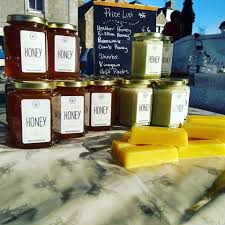Meet The Makers: Udny Provender

We spoke to Liz from Udny Provender to find out more about bees, honey and what we can make with it!
Tell us about yourself…
We are a wife and husband team with backgrounds in science and ecology and have run Udny Provender for the past 5 years. We have always been interested in foraging for and growing our own food and in 2016 we bought a smallholding outside the village of Methlick to let us be a bit more productive. We now grow nearly all our own fruit for our vinegars and shrubs and we have created a wildflower meadow where we keep some of our bees.
What inspired you to start keeping bees?
Ewan used to research honey bee health at the University of Aberdeen and with our interest in growing our own we started with a few hives to make a bit of honey for ourselves and friends and family. It then got a bit out of control and became a full blown operation! We now have a barn full of gear and equipment and hives spread across Aberdeenshire.
How many bees do you keep?
At the moment we have about 40 hives. It fluctuates through the season as we lose some to swarming and we catch some other swarms! We also breed our own queen bees and try to improve our numbers of the native Scottish honey bee.
Should we give bees sugar water to help them out or is that an old wives tale?
Well, bees need sugars for day to day activity such as flight and foraging or cleaning the hive. Usually they get that from nectar or from honey stores in the hive. Honey is a mix of complex and simple sugars with a bit of added protein from pollen. Giving them water and sugar on a teaspoon is a good way to perk them up and allow them to fly back to the hive if they have been caught out in the cold. Its not a good idea to leave containers of sugar water permanently out for bees, as this can ferment, attract wasps and other pests, and also contaminate any honey the bees are making in the hive!
Why is honey (especially local) so good for you?
There are a lot of myths about the benefits of honey - many exaggerated ! Some say that as the bees forage on flowers up to about 5km around each hive it primes you against bouts of hayfever. There hasn't been much research done on this yet, but what has been done is encouraging, and certainly some people absolutely swear by it! Honey is naturally antibacterial, and antiseptic and can be very soothing when you have a sore throat and a cold.The main reason we believe honey is good for you is that it tastes so lovely and is a great source of non-processed sugar.
Manuka honey…worth the money?
My New Zealand beekeeper pals are not going to like this but probably not, at least not some of the crazy prices you see for it. I've seen small jars of Manuka honey on sale for more than £50 or even £100. All honeys are naturally antibiotic and contain antioxidants. There have been studies that show the dark Scottish and Irish Heather honeys have just as much phenolic content which is the antioxidant with health benefits that Manuka is known for. So save those pennies and buy some local honey that’s not been shipped round the world!
Honey roast veg is our favourite at Christmas time. Can you recommend any other dishes that are great with honey added?
Sometimes simple is best…..can you beat a bowl of porridge with honey stirred through it or a piece of toast with a thick spread of a set honey? We also love our runny honey with a lovely sheep’s milk cheese like spanish manchego or with a crumbly ricotta. You can also try using honey instead of golden syrup in lots of recipes, I always make my flapjacks with honey, its delicious! Honey goes really well with pork or lamb and we will be glazing our Christmas ham from our home reared piggies with a honey, cardamom and fennel glaze. Yum!
You can find Udny Provender's seasonal honeys in store!

